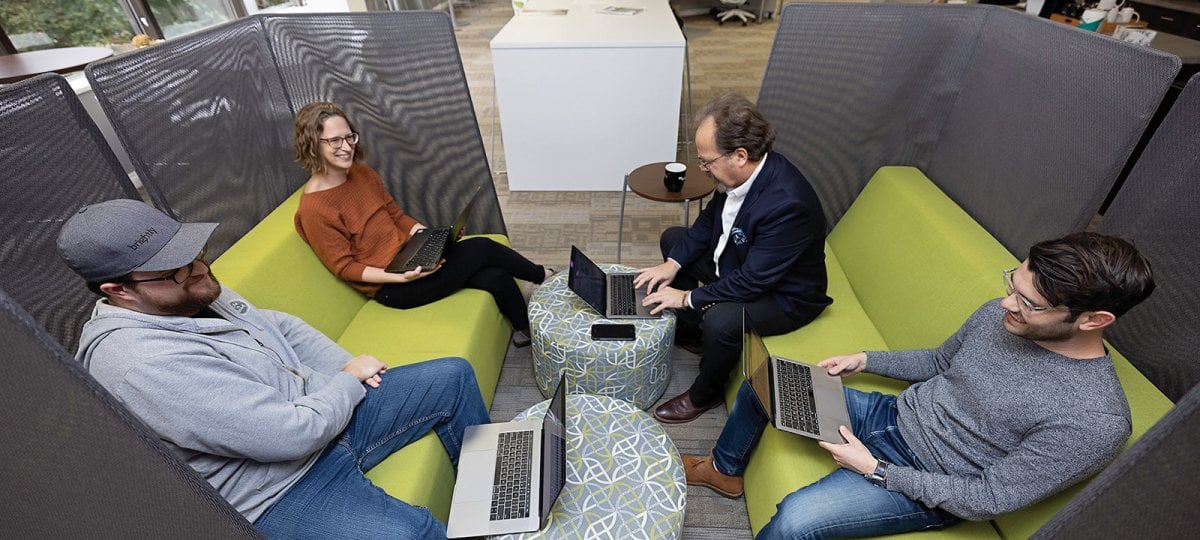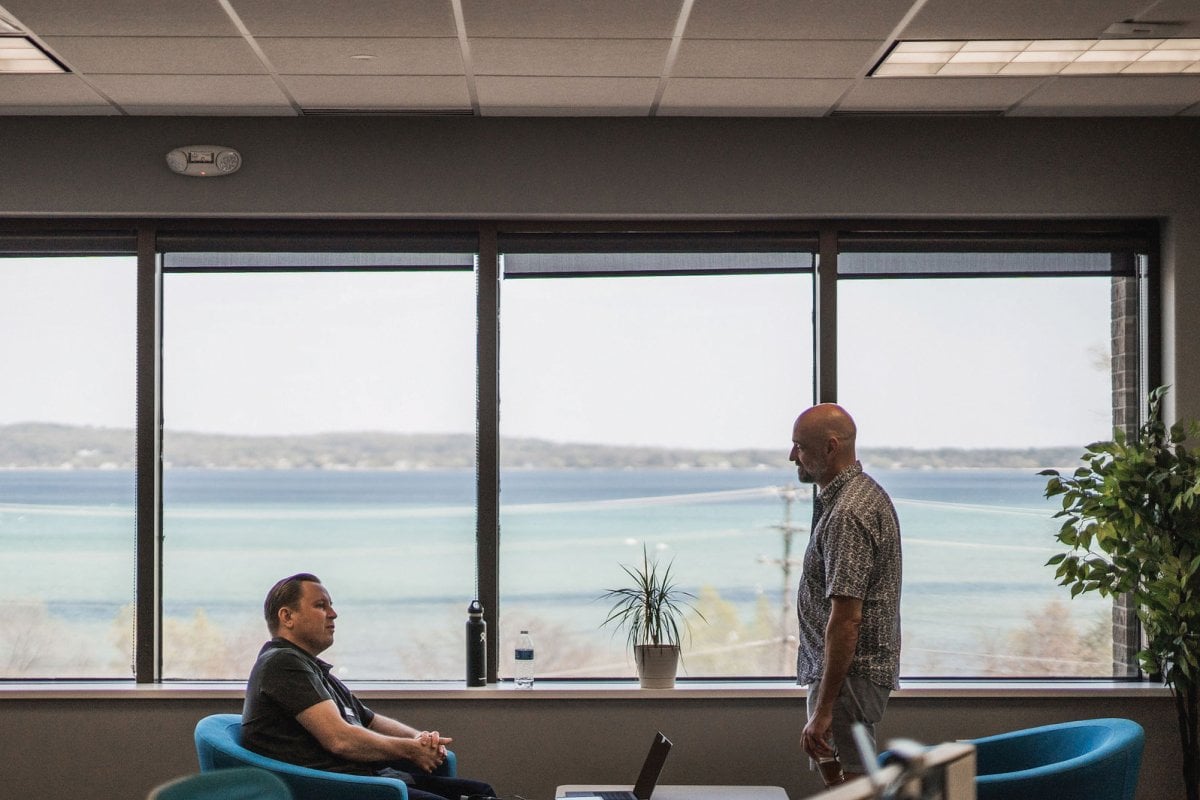Guidance from experienced and visionary industry leaders helps the College of Business equip students with the skills they need to excel in their careers. Meet Eric Roberts, a member of both the Dean's Advisory Council and the Husky family, who illustrates how real-world networking and frank feedback fuel success.
"My primary passion is ensuring that curriculum and student focus remain aligned with the needs of industry," says Roberts. "I agreed to serve on the advisory council because I believe so strongly in the value of Michigan Tech. While my degree is in mechanical engineering, I've spent the majority of my career on the business side of technology."
Roberts, who graduated in 1993 and went on to earn his MBA in finance from DePaul's Kellstadt School of Business in 2001, brings more than 30 years of experience in technology-based leadership to his role on the advisory council. He served as vice president of revenue operations at Saba Software, as well as taking on executive roles at Blackberry, Good Technology, and Motorola. Roberts' most recent role was as executive director of 20Fathoms, a technology startup incubator located in Traverse City, Michigan. He retired in September 2024, but will continue to serve on the nonprofit's board.
Roberts, who took the position at 20Fathoms in 2021, said the shift to the nonprofit sector was both a happy and challenging transition.

"I've learned so much about the differences—not only the mechanics and structure of nonprofit versus for-profit, but also the emotional side of what drives success," he says. "It's been a real growth opportunity for me personally to serve startups and take pride and satisfaction with their success."
During his time with 20Fathoms, Roberts was a part of above- and below-the bridge consortiums exploring potential research and educational opportunities for Michigan Tech in the Grand Traverse area. "Because there's no University research in the region, the most exciting thing is the 'greenfield' opportunity to partner with organizations like ours to harness resources for technology transfer and commercialization opportunities—not to mention, grow the University's research base," says Roberts.
"I always say capital markets are undefeated. That is, if you have a product that the market is willing to pay you for at a price that allows you to make a profit, you're probably in pretty good shape."
What Huskies Can Learn from a Fellow Husky
When it comes to for-profit entrepreneurship, Roberts has espoused the cautionary adage that starting and growing a scalable business is like eating glass and staring at the sun. From his perspective, nothing is more important than product and market alignment—the right fit is essential.
In Roberts' world, GSD typically looks like:
- Define a clear and specific intended outcome. Define what victory looks like and when it's expected.
- Outline and capture all the specific steps and dependencies that will accomplish that outcome.
- Validate that you have the resources and inputs needed to accomplish it.
- Go execute.
- Hit every milestone you outline. Don't ignore interim milestones or they'll stack up, making it impossible to catch up.
But the formula doesn't hold unless you're willing to put in the time. "I haven't met any very successful entrepreneurs who only worked 40 hours a week," says Roberts. "It does take that grit, resilience, and fight you always hear about (the glass and sun thing!)."
On his LinkedIn profile, Roberts lists getting stuff done (that's the PG-rated version of GSD!) as one of his top skills.
"GSD is an attitude—it's fun and easy to start things, and it's really hard to finish them," he says. "You need a technical project-management approach for sure. But at the end of the day, if you're simply unwilling to lose, fail, give up, or fall short of the goal and you're willing to to fight with everything you've got, then you are probably a GSD person!"
All in the Michigan Tech Family
Roberts and his wife Christine, a now-retired 1991 mechanical engineering grad, first crossed paths on different courts (basketball and volleyball, respectively) at the Student Development Complex. "Our best estimate is that we first met in 1990," says Roberts. "We never really knew each other up there, though. We began dating shortly after I graduated in 1993 and did the long-distance relationship thing for about a year before I moved back to the Midwest (my first job was in Connecticut for Kimberly-Clark). We married in 1996."
There's another Husky in the family. The couple's daughter is a senior in biomedical engineering at Tech and plans to attend medical school after graduation in spring 2025.
Roberts says he has "waaaay too many favorite Tech memories to include here— but I remember blizzardy Friday and Saturday nights trudging up to the SDC for a hockey game. From the Pep Band to the energy in the arena, it's a feeling I'll never forget. And then, more often than not, heading down to The Library in Houghton to listen to Gary Tunstall sing and play guitar for the rest of the night. I can still hear him playing 'I Wanna Drive the Zamboni.'"


A Golden Nugget of Advice for Michigan Tech COB Students
"The most important things Tech taught me were character: surround yourself with good people; humility: there's always someone smarter than you; and accountability: step forward when everyone else steps back," says Roberts. He also advises Huskies to be confident, leaning into the excellence of their career preparation.
"Neither my wife nor I dreamed of the career success we've achieved," said Roberts. "You are capable of significantly more than you think you are. No joke—I lived and worked in Silicon Valley for eight years. The college graduates I met from elsewhere were not smarter, more clever, or better. They didn't have more grit, they didn't have more resilience. When you walk out the door from Michigan Tech, aim high—and then 10X that stuff (PG version!). You have so much more potential than you realize!"
Michigan Technological University is an R1 public research university founded in 1885 in Houghton, and is home to nearly 7,500 students from more than 60 countries around the world. Consistently ranked among the best universities in the country for return on investment, Michigan's flagship technological university offers more than 120 undergraduate and graduate degree programs in science and technology, engineering, computing, forestry, business, health professions, humanities, mathematics, social sciences, and the arts. The rural campus is situated just miles from Lake Superior in Michigan's Upper Peninsula, offering year-round opportunities for outdoor adventure.




